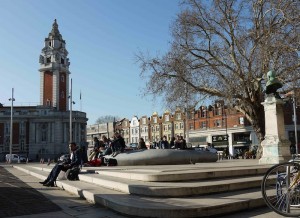
By Kaye Wiggins
Poorer families are likely to be forced out of Brixton and the surrounding areas once government welfare reforms take effect in April, according to a report from Lambeth Council.
The report predicts that Lambeth – an area that includes Brixton, Clapham, Stockwell and Streatham – will become a “net exporter” of families when the government brings in a limit on how much housing benefit a family can claim.
It means some families from more expensive parts of London will move to the area in search of cheaper rents, but more will leave Lambeth for places that are cheaper still.
“There is unlikely to be sufficient cheaper accommodation in Lambeth, so families will be forced to move further afield to find an affordable home or rent a smaller property, which will have consequences for overcrowding,” it says.
The report, which councillors are due to discuss on Monday evening, also warns that capping people’s benefits could lead to other social problems, such as an increase in domestic violence, mental health problems, drug and alcohol abuse and a growing number of children being taken into care.
It also says the changes, designed to cut government spending, could actually increase costs to the council by up to £6m a year because more people would become dependent on its services, such as temporary accommodation and other housing support.
It says the changes could also lead to more children being taken into care or being assigned social workers, because financial problems could cause family breakdowns. This would place another strain on the council’s finances, the report says.
At the same time, the council would lose income from rents as people in social housing struggled to pay because of the loss of benefits, it says. This could cost the council between £2.5m and £3.5m a year, it estimates.
The Department for Work and Pensions says its changes will “address some of the unfairness that has become inherent in the housing benefit system and in many cases a barrier to helping people into work.” It says the reforms will save nearly £2bn in 2014/15 and will make housing benefit “more fair and better targeted.”
IN FIGURES: Benefit cuts in Lambeth
670: Number of households that will be hit by the cap on benefits, due to begin in April 2013
£94: Average amount of money these households will lose every week
£650: Maximum amount of money these households could lose every week
Figures from Lambeth Council







It would probably help if the council stopped selling all the housing stock to developers and did it up instead, for the use of council tenants.
I think this is absolutely disgusting!! how can you ethnically cleanse a city that needs to be used and enjoyed by everyone, there should be a revolution and another riot! to stop this kind of Tory behaviour!”!”” im disgusted
Oh yes indeedy, I can.
Firstly, we need to get the ‘debt crisis’ in perspective. From 1918 to 1961 the UK national debt was over 100% of GDP. During that period the government introduced the welfare state, the NHS, state pensions, comprehensive education, built millions of council houses, and nationalised a range of industries. The public sector grew and there was economic growth.
Today, the coalition government wants to turn back the clock. It is set on dismantling the NHS and comprehensive education, and it is attacking the welfare state. It is not doing this because the country is on the verge of economic collapse, it is doing it because it is ideologically opposed to public services and the welfare state, and committed to handing over more of our public assets to big business.
More here, if you can be bothered to read:
http://www.pcs.org.uk/en/campaigns/campaign-resources/there-is-an-alternative-the-case-against-cuts-in-public-spending.cfm#The_government_s_cuts_strategy___and_why_it_s_wrong
From the overall tone of this article, it seems that we are being expected to deplore these changes to welfare reform.
It’s unarguable that the cost of all housing in London is far too high; the only way to ameliorate this problem is to massively increase the supply of new housing in London. There are so many brownfield sites available, and the big housebuilders are sitting on landbanks that could be built on.
But there are inconsistencies in Lambeth’s pleadings. If people experience cuts in their benefits, how can they then spend more on drugs and alcohol ? Surely they will have to cut back on their consumption of intoxicants if they have less money. It’s not clear to me anyway that benefits payments are expected to cover illegal (presumably) drug use.
The unavoidable fact is that it’s expensive to live in London. If we decide that it is desirable to subsidise people to live in areas that they could not otherwise afford, that’s an expensive proposition. The idea of taxing the bankers to the hilt to pay for all this is a comforting fantasy: there just aren’t enough of them, and anyway they’ll leave the country if taxes get too high.
So the kind of massive transfer payments required for a social engineering project of this scale can only be found by taxing tens of millions of ordinary working people. In other words, taking money from the modestly or comfortably paid, and giving it to people who are a bit worse off than them. Is this so obviously a morally virtuous act ?
From the overal tone of your post you come across as an ignorant snob. Let me guess, you have zero experience of having to live on welfare, right?
Let’s say that your various insults are valid. Once we’ve got past that, can you now explain my reasoning is flawed ?